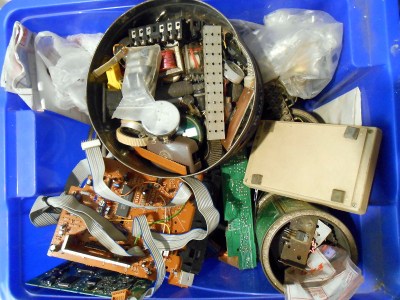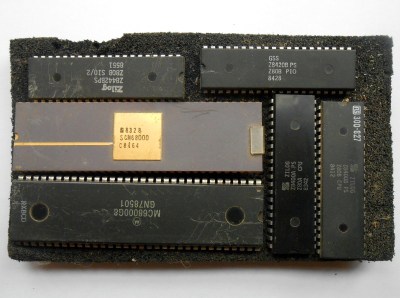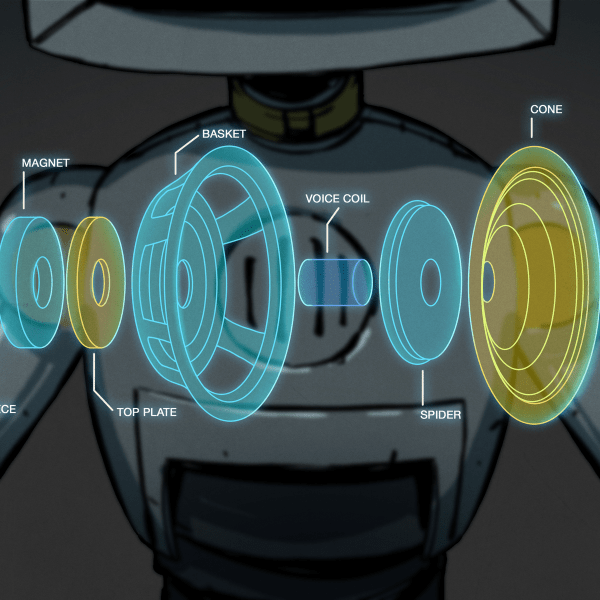There it was, after twenty minutes of turning the place over, looking through assorted storage boxes. A Thinwire Ethernet network. About the smallest possible Thinwire Ethernet network as it happens, a crimped BNC lead about 100mm long and capped at each end by a T-piece and a 50 ohm terminator. I’d been looking for a BNC T-piece on which to hook up another terminator to a piece of test equipment, and I’d found two of them.
As I hooked up the test I wanted to run I found myself considering the absurdity of the situation. I last worked somewhere with a Thinwire network in the mid 1990s, and fortunately I am likely to never see another one in my life. If you’ve never encountered Thinwire, be thankful. A single piece of co-ax connecting all computers on the network, on which the tiniest fault causes all to fail.
So why had I held on to all the parts to make one, albeit the smallest possible variant? Some kind of memento, to remind me of the Good Old Days of running round an office with a cable tester perhaps? Or was I just returning to my past as a hoarder, like a Tolkienic dragon perched atop a mountain of electronic junk, and not the good kind of junk?
My Guilty Secret

What follows will probably be a familiar tale to many readers, one of a huge collection of boxes bursting with Stuff That Might Be Useful Someday, or even Stuff That’s Just Too Good To Throw Away. It’s possible that there will be readers for whom this is not a problem, but I suspect I will not be alone in wrestling with it from time to time, so it’s worth examination. Why do we do it, and what strategies can be taken to mitigate it?
A few decades ago, ordering electronic components was a fairly slow and expensive process. There were a limited number of mail-order companies with large paper catalogues, and your order had to go through two postal delays as it made its way to the supplier and then as its parts made their way to you. This is written from a small country, I can only imagine the extra delays when an order had to traverse a continent.
So back then there was something of a culture of hoarding electronic junk. Particularly if you were an impecunious teen. There was no online next-day-delivery, and even if there had been you probably wouldn’t have been able to afford it. People hung on to pieces of dead electronics as sources of parts and to swap for other parts. They probably also snagged more than a few pieces of functional kit along the way, after all if it works it’s Too Good To Throw Away, isn’t it?
The Path To Junk Salvation
If your course followed mine, you’ll know where this is going. After a few years of electronic endeavours I had a hoard approaching mini-dragonesque proportions even if not the full Tolkien. I had the space for it, but even I could tell it had gotten a little out of hand. Something had to be done.
It’s important to understand that to successfully deal with something of this nature the person involved will have to themselves recognize that it has become a problem. There will be no shortage of people taking it upon themselves to tell them, but this is not constructive as here the solution has to come from within. It is a daunting prospect to deal with a mountain of junk, and adding stress or pressure does not reduce that.
The way I chose to do it when I went through the process a few years ago was to adopt a rigorous strategy of evaluation for each item, with a set of criteria to apply to it and decide its fate. I looked at value, usefulness, and how long it had been since I had used or even seen the item, and used what I found to inform my decisions.
To The Bin With (Most Of) It!

Value is pretty easy. Is it worth much? If it’s a broken timebase panel from a 1970s Philips TV, then probably not. To the bin with it! More difficult was intangible value, did it remind me of something? A non-functional prototype amplifier board from my days in student radio for example. I made that, remembered the good times in a cramped studio. But was it going to feature in my life again? Let’s face it, no. In the bin.
Surprisingly difficult were hoards of old components. Miscellaneous chips with 1970s and 1980s date codes stuffed into biscuit tins. I never expected to have qualms about those, and consulted Google on obscure part numbers just to see what it was I’d got. In the end I hung on to a few choice examples for old time’s sale stuck on a piece of conductive foam. I’ll never need a couple of 68000s or a brace of Z80s with support chips, but at least they take up very little space.
Usefulness was yet again straightforward. Tools, hang on to them. Motors, though, a different matter. You know how it is, you rip something apart and end up with some motors, which you put on one side because they’re Too Good To Throw Away. I started putting any motors I found into a plastic tub, thinking I’d collect them together and some day they’d be useful. I wish I’d taken a picture now, because I could show you a tub overflowing with more motors than I could possibly use in a lifetime. I adopted another rule, to only hang on to a few of anything I had a huge number of, and put the rest on my, by now, burgeoning metal scrap pile.
It’s Past Time to Part Ways
Finally, I applied a time limit to everything else that hadn’t already made the cut. If I hadn’t done anything with it in a decade and it wasn’t intrinsically or sentimentally valuable, it went. I was amazed at the things I had no idea I still owned, stuff that had been carefully packed into boxes. For example, where on earth did I get a pile of Exabyte data backup tapes, and why was I holding on to a pile of useless and outdated VESA local bus graphics cards?
At the end of it all, after I had carted the piles of scrap, rubbish, and recycling to their respective destinations, I was left with a small selection of plastic tubs. Mains cables and extensions, data, signal, and network cables, electronic components, and tools. One set of shelves takes the lot, so I can put all the other non-electronic detritus of 21st century life on the rest of my shelves. Several years later I am now very wary of taking on any more junk, and if I don’t have an immediate need for whatever it is then it doesn’t come home with me. I buy components online as I need them, so I have little need to hold on to a stock. This is not to say I’m entirely cured, I find I now have more than one sewing machine and somehow a pile of ATX power supplies has become part of my life, but at least I can see the danger before it happens.
You’ll have your own tales of battles with the tide of junk, I’m sure. It seems each of the Hackaday writers does. Tell us your horror stories in the comments, and tell us how you dealt with it. If you’re wondering why I still have that Thinwire network, I have no idea. Perhaps it has a life of its own and wormed its way in unseen while I was evicting its brethren.
















Hmmm perspective, from a Gen Xer…
We grew up hearing stories of the depression and wartime rationing on our grandparents knees… there was labor unrest and strikes and resultant shortages in the 70s, some nights, some areas, we went without power and/or heat, clustered round a candle. The cold war was still rather “warry” apparently, we felt the threat of imminent doom, civil defense briefs about hunkering down in your basement for a few weeks or constructing shelters were on between the cartoons.. then some light, easing tensions, the fun of the first video games, giving way to economic turmoil of early 80s, crazy interest rates, people barely keeping their houses…. or often not… increasing awareness of another kind of doom, the boomers above us, expected not to relinquish jobs and be able to “vote themselves all the money”, however, some brief boom times again, but going into the 90s, the free/cheap higher education ride had been halted, boomer’s kids didn’t need it for a few years yet of course, and the last of them got theirs. So us and our parents unprepared, we went to college hungry to scrape by, meanwhile inflation was cracking on pretty steady, so most of our costs had doubled over a 4 year course, and HE had begun that business mentality, trying to suck cash out of us at every turn…. Some graduated in time to ride the dotcom boom, but we know what happened there. Picking ourselves up again, we began to feel the 2008 crisis approaching, getting a sixth sense for this kind of shit by now, but it was pissing against a hurricane for us to do much, too few we are. Meanwhile we were witnessing the total annihilation of the cheap/reasonable/top brand model in consumer goods as everything got unbelievably cheaped out, and large and small appliances our parents expected to last 10 or 15 years were getting to be such cheap crap they lasted 1 if you were lucky, and we’d seen the difference…
So yah, some of us are a bit clingy with our stuff, we tend to imminently expect not to be able to afford new stuff, and that if we can it won’t be any good. Seems some of the old crap we hoard and manage and use is more worth spending $20 repair to squeeze another 5 years out of than the $20 replacement which we expect to last a year, and be unrepairable. We tend to double up on any we see at yard sales, for us we witnessed a technological peak sometime in the early 2000s where inexpensive/good was possible, and it all looks like a sharp downhill now. We are expecting the retirement rug to be yanked from under our feet any time, and to need to work into our old age to make ends meet. Some of our investments out of the little money we’ve ever had spare are kind of “alternative”, as a precaution against every type of pension fund imploding, which may be some of the “stuff” we are hoping may appreciate in value if we can keep hold of it long enough. Periods of plenty have been very few, we’re always in the wrong life cycle phase for them. We’re not the wave, we’re clawing for survival in the undertow.
So we are our grandparents, of the make do and mend, and you’ll never know when you’ll need it type, because that’s what we’ve experienced. We’d like to be more organized of course, but we’ll be a hard sell for the “it’s not worth keeping” theory, we know better, this shit’s saved our bacon a dozen times through the years.
Graduated? rofl….
Dad was teaching me electronics at 3 and nearly got me electrocuted! That SCARY buzz in my hand made up my mind that HAD to conquer that “stuff”… lotta power in it! Majik! And I did conquer. Conquered by eating, sleeping, and breathing electronics! Result: I’m retired at 57 and electronics has been good to me. Maintained flight simulators for years… maintained research devices for a college chemistry department, did high reliability electronics for the railroad industry…. got into medical devices for years and years, hand built my first computer out of parts, powerered it up, then discovered there was this thing called software that was also needed! Taught myself machine code (1802), made a ton of $$$ off CP/M and Xmodem, earned royalties for years from a 8K memory board I designed, became one of the earliest network engineers, casino security systems, tested #1 for the position of broadcast engineer of a TV station (but couldn’t answer the question about “The Heidi Incident” and lost my shot at that position), but medical devices kept calling me back over and over and ended up the senior biomed of a hospital. And all those years my hobby has been electronics. And that stash of parts was REQUIRED!
I do not have a degree, but I do eat sleep and breath electronics. It was my stash of parts and that first BUZZ in my hand that taught me. An obsession.
Your parts stash is valuable, more than you can imagine. It is that from which you learn. And your ability to throw out the “right bits” is equally important. (I don’t have a single tube anymore.) You do NEED to keep your parts… and cull out the garbage… and keep it all organized.
Keep your stuff folks!
Yeah, well there’s the diff between the wave and the trough, lots of people coming up to retire at the top of their fields now never needed a degree, partially because there wasn’t a particularly relevant one until 10-15 years after that field became significant. Younger guys coming in now, probably need to be at PhD level to even get their feet on a career path that potentially leads where those guys are retiring from. Those retirees would definitely have PhD level and above knowledge in their fields, but they never needed it all “up front” as it were.
Dad did agree with your statement… so he retrained out of electronics and into mainframe programming, (thus dragging me into COBOL with him). I stayed my course in electronics and rode the “new wave” of advancements in a field he thought was “over with”. It’s not over with by ANY means… the laws of physics are not changing… electronics is still where the magik will be happening. It’s not tubes anymore, nor transistors, but it’s still electronics and anyone can get on the wave and ride it.
DeJa Vu here for me… I remember a similar discussion as chips were coming available…. replacing transistors and later saw that opinion was wrong! I remember a similar discussion as transistors were becoming available… replacing tubes… and later saw that opinion was wrong!. I do apologize Sir that I predict the same now. It’s just changing, rather than going away. And remind that most advances come from great labs with tons degrees and loads of money, but it’s the guys in the garage that made the APPLE ][, the airplane, the motorcycle, the car, the … … …
Right, new “ground floor” tech coming along all the time.
Personally have a hard time breaking out of “dabbling” in fields like that, though. Everyone elses McJob is more important than me breaking out in business mode. Lots of large family politics. Need to pile a whole whack of empties outside my shop, so they think I’ve taken up a serious hobby, like alcoholism.
I am moving from Korea to Canada soon. It is 8,000 km to my new place. I have to bin or give away everything in my hoard. Giving stuff away takes too much time. Selling stuff for scrap yields too little money for the time involved. Simply putting it in the recycling bin where someone else profits is the best way to go. There is a certain amount of liberty in simply getting rid of everything. Tossing out the first couple of items rom my junk hoard was hard but it is getting easier. Right now I find my self walking around the house looking for stuff that is damaged, is too old, I have not touched in 6 months, or I will not touch in 3 months. If I find something then it goes in the trash.
There’s this one guy at the Puyallup Hamfest. He has this really old microphone, not sure what it goes to, but he wants a high price for it if I remember right. He’s been there every year with the same stuff for at least as long as I’ve been a ham.
I was always a minimalist. If I didn’t use it in a year, it was gone. I do keep a spare monitor, keyboard, and mouse for the PC since those are the 3 things I use the most. I only have ONE HF radio, a Kenwood TS-430S. I’ve wanted to buy so much old stuff on Ebay, but I remember that the wallet is so empty the moths have taken up residence. I think, seeing that elderly ham, year after year with the same microphone taught me a lesson. Don’t do that. :) I live by the adage, you can’t take it with you. I have one box with “junk” and that’s all I allow myself.
I dealt with a bit of this by making my own HackerBox which I limited my junk collection to 2 small boxes and a shelf in the shed is about the limit of what I’m willing to manage and sending parts to another person in my state.
http://www.java-tips.org/
Spam
I have quite a collection of electronic parts and junk, and here’s a couple things I’ve recently realized:
1. It doesn’t matter if you have something packed away if you don’t remember you have it.
I have numerous boxes of stuff, some of which haven’t been opened in years. I’m not sure of what is even in all of them. So there’s not much point in the stuff being there. On the other hand, if I start going through the boxes, I’ll remember what the stuff is and decide that it’s still worth keeping.
2. Even if you do remember that you have an item, it doesn’t matter if you can’t figure out where you put it.
There have been several times recently where I knew I had a part I needed but couldn’t find it. On one occasion I spent an hour looking for a high brightness blue LED on one of those star shaped heat sinks. I gave up. Then a few days later I happened to find it.
So, if you are going to hoard electronics, make sure you properly sort it. At least sort it by the type of parts, into some sort of storage bins, so that you have a much narrower search when you are looking for something. If that blue LED had been in a storage box of LEDs I would have found it in a minute or two.
If you have more time, catalog stuff in a spreadsheet with all the parts, and assign “locations” to the items in the sheet that match labels on the boxes the stuff is in.
Knock, knock, knock, Jenny!
Knock, knock, knock, Jenny!
Knock, knock, knock, Jenny!
Can we get article(s) about front end and backend solutions for cataloguing and inventorying hacker stash pretty plz?
I’d be hoping for something kinda handsfree for entry like voice recog reading parts out as you sort/find them, mostly offline but able to self populate fields by internet searches of part numbers. Then something decent for looking them up with. I actually forget what I tried about a decade ago with an inventory of PC parts, laborious manual entry, and it was somehow useless, I could never find what I was looking for without excessive broadening of search terms, and getting results in the dozens rather than handfuls which I then had to eyeball each record. I’d got them fairly well organised at that point anyway and it was easier to walk up to shelf pull appropriate “shoebox” and eyeball that way…. but that’s not so-so great if you wanna plan bigger projects and physically locate everything and bury workbench under pile of them, rather than virtually locate them and assign them to project if you know what I mean.
RW – Yes that does sound like a “sexy” coder project. That could be someone’s next project at a large manufacturer or somewhere. I would suggest using a STT built-into Windows, make the p/n’s indexed to your own made-up numbering system to make things simpler than large multi-length alphanumerics (like build a database to cross ref your STT input), build an auto lookup web browser using a VB script screen-scraper output (via ASP/active server pages) that removes ad-bloat and image fluff and only supplies text that your interested in (i.e. part numbers and description), the whole thing is put into a text field you subsequently copy and paste to a WordProc. Or just use ASP streaming text object to a database text file automatically.
I know it sounds convoluted but some coders know what I’m talking about. However, they might use MS-SQL or something even more complicated.
———————————————————–
But I just had a RED APPLE moment! (Imagine the American advert for Redd’s Apple Ale? https://youtu.be/w2O1Lb69AfQ ):
– Go to Walmart and get some plastic sheet protectors.
– Take a digital photo of the junk in one box all spread out on the floor in front of it. AND a photo of box too.
– Put everything back in the box, bag, or container ANY WAY you like (dump back in?).
– Then go to your PC and color print them out on regular paper. 2 copies for front and rear sign within sheet protector.
– Then glue, staple, hang, attach the sheet on the container accordingly.
Now you know what’s in that black plastic container or zipper canvas/nylon bag. No inventory. No guessing, No random opening to check contents. If you want to grease-pencil off something that got used then so be it. Have at it. You can always take new photos later. Now that is a labor-saver idea. Small component parts are a bit more problematic I think. You may need more labor for them. Maybe keep the 2nd copy in your office in a loose leaf binder with the EXACT location of the box typed or written on the sheet (ex. Up under the stuff in the garage next to the busted red lawn mower.).
———————————————————–
Actually, yearrrrrs before that, 90s, probably early, I was trying to organise some other parts, had a copy of dBASE IV, and manuals, and dummies books, and learned just enough to figure what I thought was the “simple” way to do it was gonna be wizard level major… anyway, sorta halfassed with windows cardfile instead.
We need an article about storage systems.
I have old junk from the 80’s two but it doesn’t bother me because it all in small plastic bags with part numbers printed on the bag and then in labeled storage containers. It is never mixes with new stuff because of it’s age. I really use any of it so perhaps it’s time to review it all again.
As others have pointed out, having stuff around is useless unless you can find things quickly so labeling and storage systems are the key to organization.
I have owned a busy electronics repair center and I can say that it’s not at all about how much ‘stuff’ you have. It’s about how well organized it is.
Spending lots of money on electronic parts is a waste of time if you don’t spend money on an adequate storage system. You don’t even need an inventory system unless your warehouse size. If the storage is well enough organized then you can simply go to where the parts should be stored and order one if there is none there.
Without organization, how long does it take to determine that have none of a specific item???
Rob (with a funny “o”) wrote:
“Without organization, how long does it take to determine that have none of a specific item???”
For me, I think it follows a Bell Curve to some extant. A lot of parts are found within a standard deviation of 20 minutes, some about 5 to 10 std dev away. B^)
needless pedantry ahead:
Not a Bell Curve (Normal Distribution) because you can’t find something faster than instantaneously (left side of the curve)
Probably more like a Log-Normal curve. (Bell-like, but without the possibility of negative values, which matches our modeling needs here.)
https://hackaday.com/2013/11/18/salvaging-gold-from-old-electronics/
The sheer volume of commentary here probably counts for something, but it seems to me that I also ought to explicity say “Thank you for writing this” to the author, Jenny List.
Seriously. Waste is a big deal, whether it’s in your home or in the waste stream, for different reasons depending upon context. You got me to throw out a *lot* of junk from my basement the day that this was published.
I find it interesting that no one has used the term “messy” here. I am mentally ill: major depression. One of the symptoms of my mental imbalance is a tendency to horde those things with “would be a shame to throw away.” I moved from a small apartment to an even smaller apartment last year, and was coerced into parting with possessions which had personal value to me. Please do not forget, that parting with these material things left me feeling injured, violated, robbed, traumatized. It’s no use to try to put this behavior into a rational category — it’s not rational. But do remember that folks who feel this way need a whale load of empathy. Don’t make them feel any more injured, violated, robbed or traumatized than they tend to feel. Strive to maintain your patience.
Some messies can liberate themselves from superfluous possessions better than others. But the crux of the problem is mental health. If this situation sounds familiar, then maybe it’s time you sought professional help from someone in the mental-health profession. I recommend it.